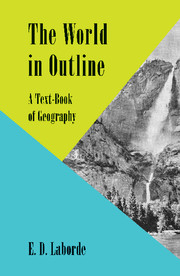Book contents
- Frontmatter
- Preface
- Contents
- PLATES
- PART I EUROPE
- PART II ASIA
- The Natural Regions
- Monsoon Asia
- The Rest of Asia
- Human Geography
- PART III AFRICA
- PART IV NORTH AMERICA
- PART V SOUTH AMERICA
- PART VI AUSTRALIA, NEW ZEALAND, AND THE PACIFIC ISLANDS
- Appendix: An Outline of Physical Geography
- Index of Place-Names
- General Index
Human Geography
from PART II - ASIA
Published online by Cambridge University Press: 05 June 2016
- Frontmatter
- Preface
- Contents
- PLATES
- PART I EUROPE
- PART II ASIA
- The Natural Regions
- Monsoon Asia
- The Rest of Asia
- Human Geography
- PART III AFRICA
- PART IV NORTH AMERICA
- PART V SOUTH AMERICA
- PART VI AUSTRALIA, NEW ZEALAND, AND THE PACIFIC ISLANDS
- Appendix: An Outline of Physical Geography
- Index of Place-Names
- General Index
Summary
Exploration. As the home of the three chief civilisations, habitable Asia has in a sense been known from earliest times. India was known to the Greeks, whose armies under Alexander the Great penetrated as far east as the Indus. Even China had been heard of in a vague way. But the upheaval of European social life which accompanied the fall of the Roman Empire and the rise to importance of Muslim peoples checked the growing acquaintance of East and West and even caused the slight knowledge of the East to be forgotten in Europe, whither the centre of Western civilisation had now moved. It was not until the Middle Ages that relations began to be re-established through the exchange of courtesies between the Crusaders and their foes, through trade, and through adventurous travellers whose curiosity led them far afield. By 1250 Transcaspia had been visited by monks or traders, some of whom wrote accounts of their journeys.
In 1271, a Venetian named Marco Polo achieved the greatest voyage of all. Reaching Bandar Abbas on the Persian Gulf, he made his way over the topland of Iran and across the Pamirs to Khotan and thence to Peking. There he attracted the attention of the Emperor and rose to be an ambassador. In this character he journeyed far and wide in China and noticed various features, such as the use of coal for fuel, in which Chinese civilisation surpassed that of the West. After some fifteen years he returned home, journeying by ship through the Straits of Malacca to the Persian Gulf. He wrote an account of his adventures, but unfortunately he had so many strange things to tell that the whole book was regarded as a fictitious narrative.
Two hundred years later, the obstacles put in the way of trade by the Ottoman Turks caused the Portuguese to seek an ocean route to the East, and in 1497 Vasco da Gama rounded the Cape of Good Hope and coasted northwards to Zanzibar. There he found Arab seamen who were accustomed to use the periodic monsoon winds for voyages to India and back. In fact, these Arabs had penetrated as far as Java. With the help of Arab pilots da Gama reached Calicut, and a few years later other Portuguese navigators sailed to Malaya.
- Type
- Chapter
- Information
- The World in OutlineA Text-Book of Geography, pp. 188 - 193Publisher: Cambridge University PressPrint publication year: 2013



